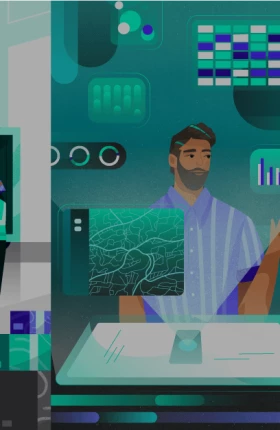What is Responsible AI?
Responsible AI is the process of developing and operating artificial intelligence systems that align with organizational purpose and ethical values, achieving transformative business impact. By implementing RAI strategically, companies can resolve complex ethical questions around AI deployments and investments, accelerate innovation, and realize increased value from AI itself. Responsible AI gives leaders the ability to properly manage this powerful emerging technology.

How We Help Companies Implement Responsible AI
So far, relatively few companies have unleashed this strategic approach to responsible AI. What’s the holdup? For some organizations, the leap from responsible AI ambition to execution has proved daunting. Others are waiting to see what form regulations take. But responsible AI principles can bring benefits now as they prepare companies for new rules and the latest emerging AI technology.
Our battle-tested BCG RAI framework minimizes the time to RAI maturity while maximizing the value responsible AI can create. Built on five pillars, it is tailored to each organization’s unique starting point, culture.
Responsible AI strategy
AI Governance
Key Processes
Technology and Tools
Culture
Our Clients’ Success in Responsible AI
BCG’s responsible AI consultants have partnered with organizations around the globe in many industry sectors, creating personalized solutions that provide AI transparency and value. Here are some examples of our work.


Meet BCG's Tech Build and Design Unit
BCG’s Tools and Solutions for Responsible AI

RAI Maturity Assessment
RAI Maturity Assessment

Facet By BCG X
Facet By BCG X
GenAI Evaluator by BCG X
GenAI Evaluator by BCG X
Introducing ARTKIT
ARTKIT is BCG X’s open-source toolkit for red teaming new GenAI systems. It enables data scientists, engineers, and business decision makers to quickly close the gap between developing innovative GenAI proofs of concept and launching those concepts into the market as fully reliable, enterprise-scale solutions. ARTKIT combines human-based and automated testing, giving tech practitioners the tools they need to test new GenAI systems for:
- Proficiency—ensuring that the system consistently generates the intended value
- Safety—ensuring that it prevents harmful or offensive outputs
- Equality—ensuring that it promotes fairness in quality of service and equal access to resources
- Security—ensuring that it safeguards sensitive data and systems against bad actors
- Compliance—ensuring that it adheres to relevant legal, policy, regulatory, and ethical standards
ARTKIT enables teams to use their critical thinking and creativity to quickly mitigate potential risk. The goal is to help business decision makers and leaders harness the full power of GenAI and our BCG RAI framework, knowing that the results will be safe and equitable—and will deliver measurable, meaningful business impact.
The Future of Science Is AI-Powered
See how we're fulfilling this commitment.
Our Insights on Responsible AI


















